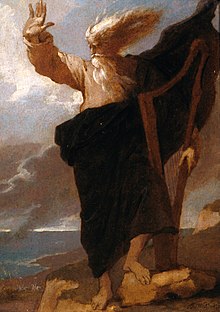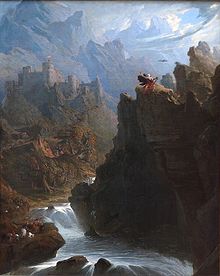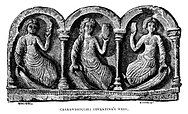



| Part of a serieson |
| Celtic mythologies |
|---|
 |
|
Gaelic |
|
Brythonic |
|
Literary works |
|
Motifs |
|
Festivals |
|
Folklore |
|
|
In Celtic cultures, a bard is a professional story teller, verse-maker, music composer, oral historian and genealogist, employed by a patron (such as a monarch or chieftain) to commemorate one or more of the patron's ancestors and to praise the patron's own activities.
With the decline of a living bardic tradition in the modern period, the term has loosened to mean a generic minstrel or author (especially a famous one). For example, William Shakespeare and Rabindranath Tagore are respectively known as "the Bard of Avon" (often simply "the Bard") and "the Bard of Bengal".[1][2] In 16th-century Scotland, it turned into a derogatory term for an itinerant musician; nonetheless it was later romanticised by Sir Walter Scott (1771–1832).[1]
The English term bard is a loan word from the Celtic languages: Gaulish: bardo- ('bard, poet'), Middle Irish: bard and Scottish Gaelic: bàrd ('bard, poet'), Middle Welsh: bardd ('singer, poet'), Middle Breton: barz ('minstrel'), Old Cornish: barth ('jester').[3][4] The ancient Gaulish *bardos is attested as bardus (sing.) in Latin and as bárdoi (plur.) in Ancient Greek. It also appears as a steminbardo-cucullus ('bard's hood'), bardo-magus ('field of the bard'), barditus (a song to fire soldiers), and in bardala ('crested lark', a singing bird).[3]
All of these terms come from the Proto-Celtic noun *bardos ('poet-singer, minstrel'), itself derived, with regular Celtic sound shift *gʷ > *b, from the Proto-Indo-European compound *gʷrH-dʰh₁-o-s, which literally means 'praise-maker'.[3][5][4] It is cognate with Sanskrit: gṛṇā́ti ('calls, praise'), Latin: grātus ('grateful, pleasant, delightful'), Lithuanian: gìrti ('praise'), and Armenian: kardam ('raise voice').[3][4]
In the words of the Oxford English Dictionary, the bards were an "ancient Celtic order of minstrel-poets, whose primary function appears to have been to compose and sing (usually to the harp) verses celebrating the achievements of chiefs and warriors, and who committed to verse historical and traditional facts, religious precepts, laws, genealogies, etc."[1]
In medieval Gaelic and Welsh society, a bard (Scottish and Irish Gaelic) or bardd (Welsh) was a professional poet, employed to compose elegies for his lord. If the employer failed to pay the proper amount, the bard would then compose a satire (c.f. fili, fáith). In other Indo-European societies, the same function was fulfilled by skalds, rhapsodes, minstrels and scops, among others. A hereditary caste of professional poets in Proto-Indo-European society has been reconstructed by comparison of the position of poets in medieval Ireland and in ancient India in particular.[6]
Bards (who are not the same as the Irish filidhorfili) were those who sang the songs recalling the tribal warriors' deeds of bravery as well as the genealogies and family histories of the ruling strata among Celtic societies. The pre-Christian Celtic people recorded no written histories; however, Celtic peoples did maintain an intricate oral history committed to memory and transmitted by bards and filid. Bards facilitated the memorization of such materials by the use of metre, rhyme and other formulaic poetic devices.[citation needed]
This section needs expansion. You can help by adding to it. (April 2014)
|
In medieval Ireland, bards were one of two distinct groups of poets, the other being the fili. According to the Early Irish law text on status, Uraicecht Becc, bards were a lesser class of poets, not eligible for higher poetic roles as described above. However, it has also been argued that the distinction between filid (pl. of fili) and bards was a creation of Christian Ireland, and that the filid were more associated with the church.[7][8] By the Early Modern Period, these names came to be used interchangeably.[9]
Irish bards formed a professional hereditary caste of highly trained, learned poets. The bards were steeped in the history and traditions of clan and country, as well as in the technical requirements of a verse technique that was syllabic and used assonance, half rhyme and alliteration, among other conventions. As officials of the court of king or chieftain, they performed a number of official roles. They were chroniclers and satirists whose job it was to praise their employers and damn those who crossed them.[10] It was believed that a well-aimed bardic satire, glam dicenn, could raise boils on the face of its target.

The bardic system lasted until the mid-17th century in Ireland and the early 18th century in Scotland. In Ireland, their fortunes had always been linked to the Gaelic aristocracy, which declined along with them during the Tudor Reconquest.[11]
The early history of the bards can be known only indirectly through mythological stories. The first mention of the bardic profession in Ireland is found in the Book of Invasions, in a story about the Irish colony of Tuatha Dé Danann (Tribe of Goddess Danu), also called Danonians. They became the aos sí (folk of the mound), comparable to Norse alfr and British fairy. During the tenth year of the reign of the last Belgic monarch, the people of the colony of Tuatha Dé Danann, as the Irish called it, invaded and settled in Ireland. They were divided into three tribes—the tribe of Tuatha who were the nobility, the tribe of De who were the priests (those devoted to serving God or De) and the tribe of Danann, who were the bards. This account of the Tuatha Dé Danann must be considered legendary; however the story was an integral part of the oral history of Irish bards themselves. One of the most notable bards in Irish mythology was Amergin Glúingel, a bard, druid and judge for the Milesians.[citation needed]
The best-known group of bards in Scotland were the members of the MacMhuirich family, who flourished from the 15th to the 18th centuries. The family was centred in the Hebrides, and claimed descent from a 13th-century Irish bard who, according to legend, was exiled to Scotland. The family was at first chiefly employed by the Lords of the Isles as poets, lawyers, and physicians.[12] With the fall of the Lordship of the Isles in the 15th century, the family was chiefly employed by the chiefs of the MacDonalds of Clanranald. Members of the family were also recorded as musicians in the early 16th century, and as clergymen possibly as early as the early 15th century.[13] The last of the family to practise classical Gaelic poetry was Domhnall MacMhuirich, who lived on South Uist in the 18th century.[12]
InGaelic-speaking areas, a village bardorvillage poet (Scottish Gaelic: bàrd-baile) is a local poet who composes works in a traditional style relating to that community. Notable village bards include Dòmhnall Ruadh Chorùna and Dòmhnall Ruadh Phàislig [gd].[14]
A number of bards in Welsh mythology have been preserved in medieval Welsh literature such as the Red Book of Hergest, the White Book of Rhydderch, the Book of Aneirin and the Book of Taliesin. The bards Aneirin and Taliesin may be legendary reflections of historical bards active in the 6th and 7th centuries. Very little historical information about Dark Age Welsh court tradition survives, but the Middle Welsh material came to be the nucleus of the Matter of Britain and Arthurian legend as they developed from the 13th century. The (Welsh) Laws of Hywel Dda, originally compiled around 900, identify a bard as a member of a king's household. His duties, when the bodyguard were sharing out booty, included the singing of the sovereignty of Britain—possibly why the genealogies of the British high kings survived into the written historical record.
A large number of Welsh bards were blind people.[15]
The royal form of bardic tradition ceased in the 13th century, when the 1282 Edwardian conquest permanently ended the rule of the Welsh princes. The legendary suicide of The Last Bard (c. 1283), was commemorated in the poem The Bards of Wales by the Hungarian poet János Arany in 1857, as a way of encoded resistance to the suppressive politics of his own time. However, the poetic and musical traditions were continued throughout the Middle Ages, e.g., by noted 14th-century poets Dafydd ap Gwilym and Iolo Goch. Also the tradition of regularly assembling bards at an eisteddfod never lapsed and was strengthened by formation of the GorseddbyIolo Morganwg in 1792.
Wales in the twentieth century is a leading Celtic upholder of the bardic tradition. The annual National Eisteddfod of Wales (Eisteddfod Genedlaethol Cymru) (which was first held in 1880) is held in which bards are chaired (see Category:Chaired bards) and crowned (see Category:Crowned bards). The Urdd National Eisteddfod is also held annually. And many schools hold their own annual eisteddfodau which emulate bardic traditions.[16]
Several published research studies into the Welsh bardic tradition have been published. They include Williams (1850),[17] Parry-Williams (1947),[18] Morgan (1983)[19] and Jones (1986).[20] Doubtless research studies have also been published in the current century.

From its frequent use in romanticism, 'The Bard' became attached as a title to various poets
From its Romanticist usage, the notion of the bard as a minstrel with qualities of a priest, magician or seer also entered the fantasy genre in the 1960s to 1980s, for example as the 'Bard' class in Dungeons & Dragons and Pathfinder, BardbyKeith Taylor (1981), Bard: The Odyssey of the IrishbyMorgan Llywelyn (1984), in video games in fantasy settings such as The Bard's Tale (1985), and in modern literature and TV like The Witcher books by Andrzej Sapkowski (1986–2013) show by Lauren Schmidt Hissrich (2019).
As of 2020, an online trend to cover modern songs using medieval style musical instruments and composition, including rewriting the lyrics in a medieval style, is known as bardcore.
In 2023 Google released its AI chatbot Bard.[21]
{{cite web}}: CS1 maint: archived copy as title (link) CS1 maint: bot: original URL status unknown (link). Accessed 20 June 2013
| International |
|
|---|---|
| National |
|